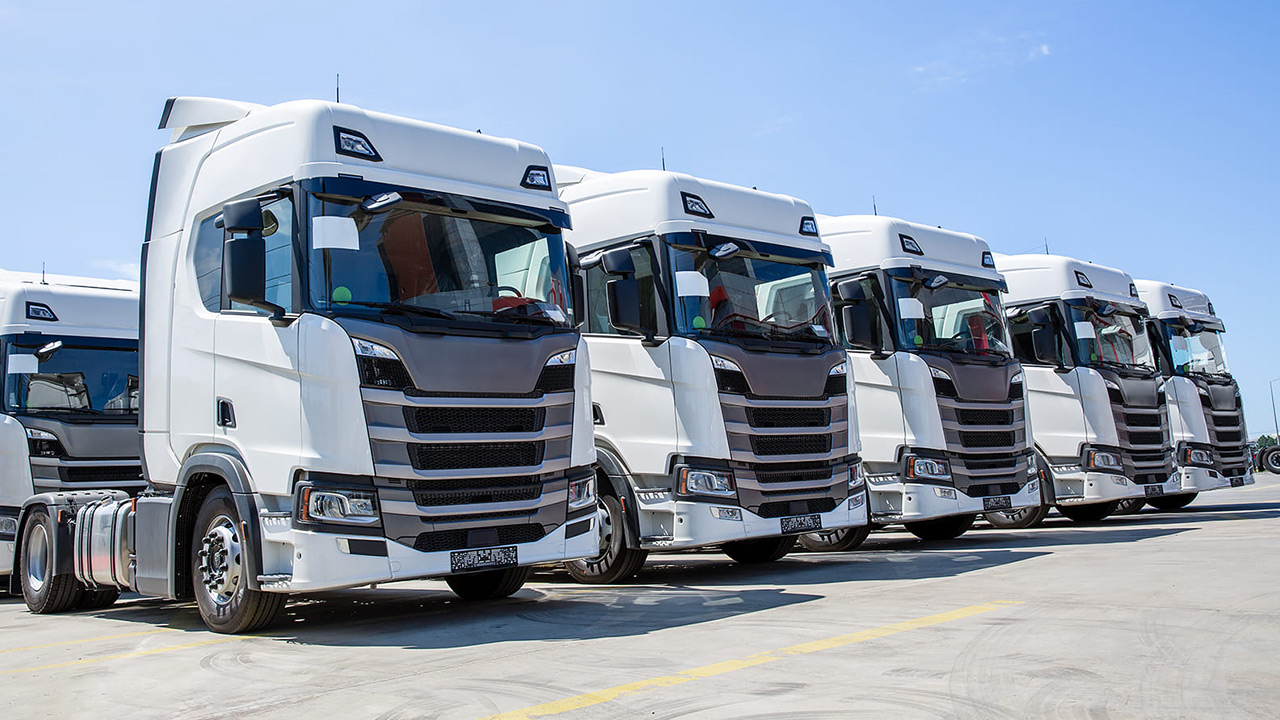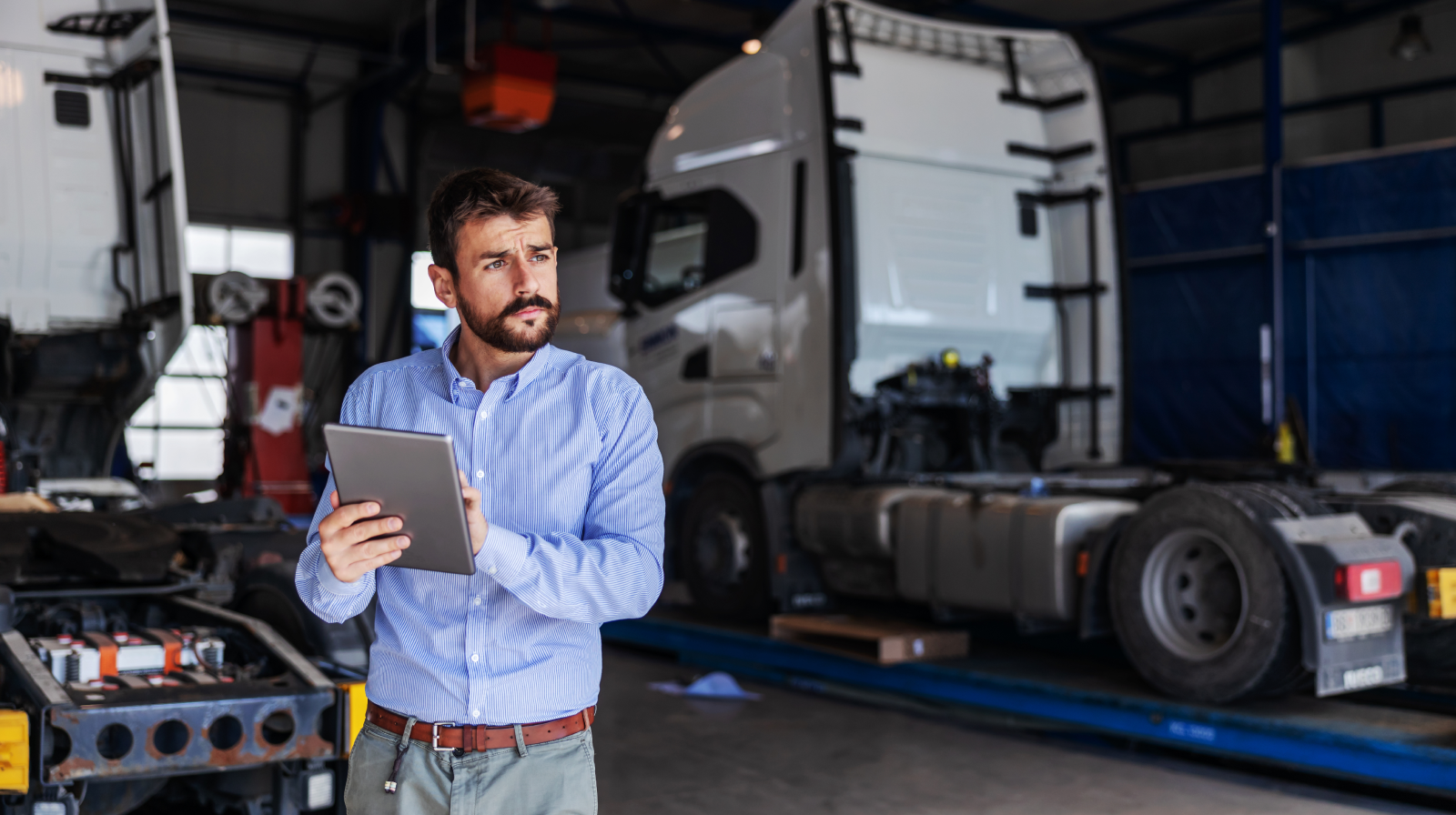Electric vehicles (EVs) aren’t just a niche anymore — they’re going mainstream across industries. And with this, the need for smarter, more efficient electric vehicle logistics is on the rise. If you're offering telematics or fleet digitalization services, this article will show how you can support logistics clients in managing their electric and mixed fleets — and how Wialon enables you to do just that in the world of electric vehicle logistics.
Electric vehicles: market overview
The next few years are the perfect time to roll out new logistics solutions, especially with the growing number of electric vehicle users. Plus, governments are fueling this growth by encouraging businesses to embrace sustainable tech.
In 2022, global sales of new electric vehicles grew by 55.1%. The United States saw a 48% increase in electric vehicle sales from 2021 to 2022, while Europe experienced a 15% rise. It is expected that European Union countries will keep up this growth due to stricter CO2 emission standards and a shift toward zero-emission vehicle mandates.
For instance, UK logistics businesses plan to invest in sustainable technology to meet national and international obligations. They are actively working to determine the next steps in their journey to net zero.
Looking ahead, the global electric vehicles market is expected to show a steady annual growth rate of 9.82% from 2024 to 2028. Major logistics players like UPS, FedEx, and DHL are leading the charge. They are integrating electric delivery vans, trucks, and even drones into their operations, proving the practical value of electric vehicles for logistics and setting examples for others to follow.
Integrating EV logistics cuts down on greenhouse gas emissions and fits perfectly with big-picture corporate sustainability goals. These goals are shaping what investors and consumers care about more and more. On top of that, the e-commerce boom means more deliveries than ever, making the need for efficient, eco-friendly delivery solutions even more urgent.
As electric vehicle logistics evolves, telematics service providers have a unique opportunity to lead the change and offer EV-ready fleet management solutions.
How does the logistics industry use EVs?
The logistics industry is increasingly turning to electric vehicles as a strategic move to modernize operations, reduce environmental impact, and cut operational costs. Companies are adopting EVs in multiple ways — both through broad operational shifts and in specific service areas where they offer clear advantages.
Fleet modernization as a strategic move
One of the key ways logistics companies are embracing EVs is by gradually modernizing their fleets. Taking it step by step helps them manage costs and adjust to new technologies at a comfortable pace.
For instance, UPS operates more than 1,000 electric and hybrid vehicles and has committed to purchasing over 10,000 electric delivery vehicles — a move that supports both sustainability and long-term operational efficiency.
EVs in last-mile delivery
In the last-mile delivery segment, EVs are especially well-suited to short-range routes and stop-and-go traffic common in urban areas.
Amazon began rolling out its electric delivery vans in the summer of 2022. Now, the company has more than 15,000 and has delivered more than 800 million packages to customers across the U.S. Also, Amazon actively uses e-cargo bikes and e-rickshaws in urban centers to speed up last-mile delivery.
Electrifying long-haul transportation
Although long-haul electrification presents many challenges, it’s gaining ground. Innovations in battery technology and charging infrastructure are key to making this viable.
Tesla’s Semi truck is a prominent example. Designed for long-range routes and capable of charging up to 70% in 30 minutes, it's already being adopted by companies like Walmart and PepsiCo as they explore ways to electrify their operations at scale.
__CTA_BANNER_123__
Benefits of electric vehicles in logistics
Companies are eager to introduce EVs because of a mix of environmental concerns, cost savings, and technological advancements. Here’s a look at the key benefits of using electric vehicles for logistics operations.
Environmental benefits
First, electric vehicles help reduce the carbon footprint. EVs have zero tailpipe emissions, so they don’t contribute to climate change. While medium- and heavy-duty vehicles make up less than 5% of the vehicles on the road, they’re responsible for over 20% of carbon emissions from the transportation sector.
For companies just starting to transition to an electric fleet but eager to reduce their environmental impact now, software can automate this process. Wialon offers a CO2 emission control feature. Using ready-made or customized formulas, fleets can easily calculate their carbon footprint through our reporting system. This makes it simple for fleets to track and manage their environmental impact effectively.
Second, EVs reduce air pollution. EVs don’t emit pollutants like nitrogen oxides and particulate matter, which are common with diesel and gasoline engines. This leads to cleaner air, especially in urban areas where logistics operations are concentrated.
Third, they cut noise pollution, too. Electric vehicles are much quieter than traditional vehicles. This means less noise pollution in residential neighborhoods and cities. Early-morning or late-night deliveries benefit from it significantly, as they can otherwise disrupt local communities.
Cost savings
EVs lead to lower operating costs. Electricity is typically cheaper than diesel or gasoline, which means big savings on fuel over time.
They also require less maintenance. EVs have fewer moving parts compared to traditional vehicles, so maintenance and repair expenses are much lower. With simpler or eliminated components like engines, transmissions, and exhaust systems, there’s less risk of breakdowns and fewer regular upkeep needs.
Governments offer incentives, tax breaks, and grants for EV usage. These incentives can help offset the higher upfront cost of electric vehicles.
Operational benefits
Electric vehicles show higher performance and efficiency. They deliver instant torque and smooth acceleration, perfect for urban deliveries with lots of stops and starts. This performance boost means faster, more efficient deliveries.
EVs contribute to overall corporate sustainability. Switching to EVs helps logistics companies hit their sustainability goals while boosting their corporate social responsibility image. It’s a win for the environment and a great way to build stronger relationships with customers, investors, and regulators who value green practices.
Technological advancements
The battery and other components are constantly improving. Better battery technology is pushing the limits, giving EVs longer ranges and faster charging times. They are a practical choice for longer routes and more demanding logistics tasks.
The charging infrastructure is smart and makes EV fleets feasible. The rise of smart charging stations, often powered by renewable energy, is making electric fleets even more practical. These solutions optimize energy use and cut costs. For instance, Amazon has equipped its distribution centers with smart charging stations to power their electric delivery vans while tapping into renewable energy sources.
The benefits of EVs in logistics are huge — spanning environmental, economic, operational, and technological gains. As more logistics companies embrace EVs, they’re helping build a greener future and boosting their own efficiency and cutting costs.
The rising use of electric vehicles in logistics highlights how the industry is adapting to meet both economic and environmental demands — it’s paving the way for cleaner, smarter operations. But like any new technology, EV fleets come with their own set of challenges — but many of these can be tackled with the right telematics software.
Main challenges in electric vehicle logistics
Switching to electric vehicles is transformative for building a sustainable future. But bringing EVs into the mainstream automotive and transportation sectors takes a team effort from governments and industry leaders to make it all work out.
Infrastructure development
One of the biggest hurdles in electric vehicle logistics is building a robust charging network. Unlike gas-powered vehicles that can refuel almost anywhere, EVs need specialized charging stations. These stations must be strategically placed to ensure they’re accessible and convenient.
Many logistics companies are stepping up to invest in EV infrastructure. For instance, FedEx has built over 500 charging stations across California, supporting more than 1,000 electric vehicles and paving the way for a greener fleet.
Integration with existing logistics systems
Bringing EVs into established logistics systems comes with technical and operational challenges. Large fleets face high upfront costs and limited options for specific needs, like heavy-duty trucks. Plus, managing range, charging times, and route planning can get tricky.
Seamless data integration between logistics platforms and EV systems is key to keeping operations running. So, telematics service providers must offer software that simplifies these adjustments for their clients. These efforts are essential for overcoming the hurdles of electric vehicle logistics and enabling smoother transitions for fleets.
Energy grid impact
As EV adoption grows, it’s putting extra demand on the electrical grid, raising concerns about capacity and reliability. In many areas, the current grid isn’t equipped to handle the surge in EV charging, especially during peak hours. Upgrading the grid will require major investments and careful planning.
To maximize EVs’ environmental benefits, integrating renewable energy sources like solar and wind into the grid is essential. However, their inconsistent availability poses challenges for maintaining a steady energy supply. Balancing renewable energy with grid demands will be critical for the future of electric vehicle logistics.
Future prospects of electric vehicles for logistics
For many telematics providers and fleet operators wondering how electric vehicles will impact logistics, the signs are clear: the shift is accelerating. The push for sustainability is reshaping fleet management trends and shaping a bright future for EVs in logistics. With advancements in technology, expanding infrastructure, supportive policies, and significant economic and environmental benefits, the outlook for electric vehicles in logistics is promising.
Technological advancements
New developments, like solid-state batteries, are set to improve energy density, reduce charging times, and extend battery life. On the other hand, self-driving electric trucks and delivery vehicles can operate around the clock to reduce labor costs, increase efficiency, and optimize routes with minimal downtime.
There’s also a new vehicle-to-everything (V2X) technology. It enables EVs to communicate with each other and infrastructure to improve traffic flow, safety, and real-time fleet coordination.
Expansion of charging infrastructure
Advanced charging stations will cut downtime, making EVs viable even for long-haul logistics. Plus, Inductive charging pads at loading docks or along roadways will allow vehicles to recharge during stops without the need for physical connections. Charging stations powered by solar or wind energy will further enhance the sustainability of electric logistics.
Policy and regulatory support
Governments are continuing to incentivize EV adoption with subsidies, tax breaks, and infrastructure investments. Stricter emissions regulations and low-emission zones are pushing logistics companies toward fleet electrification. Standardization of EV technologies will simplify integration and improve operational efficiency.
Smart mobility in logistics
Smart mobility solutions are changing logistics by using technology and data to make transportation systems more efficient and eco-friendly. For example, Mobility-as-a-Service (MaaS) platforms integrate multiple transportation services to enable logistics providers to manage shared EV fleets, optimize usage, and reduce costs.
Then, connected traffic signals and intelligent road systems will reduce congestion and improve route efficiency for EVs. AI and real-time data will allow dynamic route and schedule optimization based on traffic, weather, and demand, ensuring maximum efficiency.
More technology integration
Real-time insights into vehicle location, battery health, and energy consumption already help logistics providers manage their fleets. On top of that, advanced systems can identify potential issues before they escalate, minimizing downtime and maintenance costs.
Telematics software now can map the best routes using real-time traffic updates and charging station availability. Sophisticated tools help optimize charging schedules and reduce costs while maximizing vehicle uptime. It also simplifies regulatory compliance and provides detailed reports for performance analysis and optimization.
Wialon’s support for electric vehicle logistics
Wialon is an ultimate software for fleet digitalization, suitable for managing all kinds of fleets, including electric ones. With it, you can deliver value-added services to logistics clients managing electric fleets or help them integrate electric vehicles into operations and boost sustainability efforts. And in doing so, you’ll be growing your own business in this rapidly evolving market.
Wialon is perfectly suited to support logistics with electric vehicles by offering a robust feature kit.
- Real-time tracking and monitoring: Wialon offers real-time tracking of electric vehicles, so fleet managers can keep an eye on location, routes, and performance. This helps cut down on idle time.
- Battery monitoring and management: Wialon includes battery monitoring to keep tabs on charge levels, battery health, and energy usage. This helps with smart route planning and ensures vehicles are always ready to go.
- Route optimization: Our tools analyze traffic, and distance to suggest the best routes, cutting down travel time and energy consumption.
- Maintenance alerts and reports: Wialon sends maintenance alerts and generates reports based on vehicle usage and state. It gets easier to schedule regular maintenance and avoid potential issues.
- Data analytics and insights: Wialon’s comprehensive analytics and reporting tools provide valuable insights into vehicle performance and energy use. With it, fleet managers can make informed decisions and improve strategies.
__CTA_BANNER_TM2__
Empower your clients with EV-ready fleet management solution
Electric vehicles offer a sustainable and efficient alternative to traditional fleets. With global demand for EVs rising — fueled by government regulations, corporate sustainability goals, and advancements in battery tech — logistics companies are increasingly making the shift. Industry leaders like UPS, Amazon, and FedEx are already at the forefront, incorporating electric vehicles into everything from last-mile delivery to long-haul transport and fleet modernization.
For fleet digitalization service providers, this shift presents an exciting opportunity. As logistics companies transition to electric fleets, there’s a growing need for better EV management. That’s why Wialon offers a comprehensive set of tools for real-time tracking, battery monitoring, route optimization, and maintenance alerts.
Partner with Wialon and equip your clients with everything to optimize electric vehicle logistics, reduce costs, enhance sustainability, and ensure smooth operations.
Looking for a reliable solution for your telematics services? Wialon is trusted by 2,700+ partners around the world.
Join our communityFrequently asked questions
Why should telematics service providers care about electric vehicle logistics?
EV adoption is growing rapidly, creating new demands for tracking, route planning, and battery management. Service providers who offer EV-ready solutions can support their clients' sustainability goals and differentiate their offerings in a competitive market.
How do electric vehicles impact logistics, last-mile and long-haul delivery operations?
EVs are well-suited to last-mile delivery due to their efficiency in urban, stop-and-go environments. For long-haul routes, emerging technologies like fast-charging and high-capacity batteries are making electric trucks more viable. Service providers can help clients plan routes and manage EV range with the right software tools.
What are the main challenges in managing EV fleets?
Key challenges include limited charging infrastructure, battery range anxiety, integration with existing systems, and grid impact. Fleet digitalization service providers can solve these challenges with advanced telematics platforms that offer routing and battery monitoring.
How does Wialon support service providers working with electric fleets?
Wialon offers real-time tracking, battery analytics, route optimization, and emissions reporting. These robust features allow providers to build and offer comprehensive EV fleet management solutions.
Can Wialon handle mixed fleets of electric and traditional vehicles?
Yes. Wialon is designed to manage diverse fleets — electric, hybrid, and fuel-based — from a single platform. This enables service providers to support clients during transitional periods and offer tailored analytics for different vehicle types.
How can I offer EV-focused services to my logistics clients?
By leveraging a platform like Wialon, you can provide route planning, battery insights, and sustainability reporting. These services help your clients operate efficiently while opening new revenue streams for your business.
.jpg)




